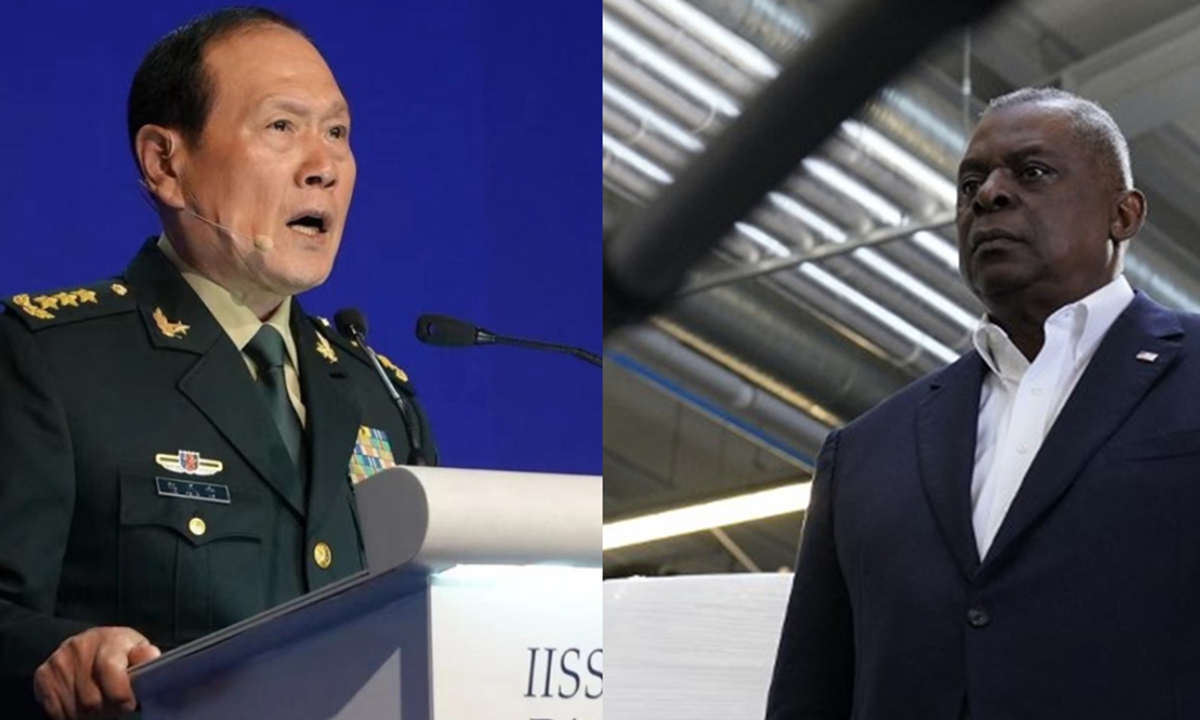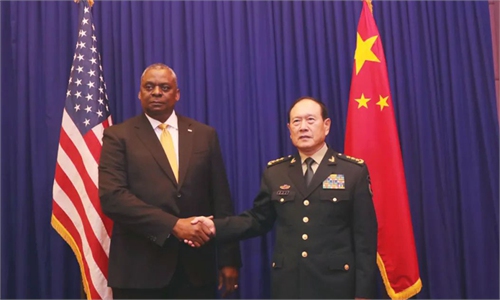US should correctly understand Chinese defense chief’s ‘tough words’: Global Times editorial

Chinese State Councilor and Defense Minister General Wei Fenghe, US Secretary of Defense Austin Lloyd Photo:File
Chinese State Councilor and Defense Minister Wei Fenghe, who is attending the ninth ASEAN Defense Ministers' Meeting-Plus in Cambodia, held talks with US Secretary of Defense Lloyd Austin on Tuesday at the latter's request. The spokesperson of the Chinese Ministry of Defense revealed after the meeting that it was a frank, deep, pragmatic and constructive strategic communication. After the two heads of state met in Bali and reached a series of important consensuses, the two countries have restarted or resumed dialogues in various important fields, and the relationship has shown signs of being stabilized.It is better to see and talk with each other than not. This is a general consensus of the international community on the current China-US relations. Especially if there is no contact and communication between high-level officials of Chinese and US militaries for a long time, and each side has to guess what the other side thinks, then the risk of misfire and even a conflict between the two militaries will be greatly increased. The region and even the whole world will be filled with anxieties. To some extent, this is where the significance of the meeting between Chinese and US defense chiefs lies. The two defense chiefs agreed during their talks that the two militaries should earnestly implement the important consensuses reached by the two heads of state, maintain communication and contact, strengthen crisis management and control, and strive to maintain regional security and stability.
Military relations are a barometer of the overall relationship between China and the US. Because of House Speaker Nancy Pelosi's provocative visit to the Taiwan island in August, China took eight countermeasures, including canceling China-US Theater Commanders Talk; canceling China-US Defense Policy Coordination Talks; and canceling China-US Military Maritime Consultative Agreement meetings. For a period of time, the "free fall" of China-US relations was mainly caused by US provocations. If the US does not provoke, there will be no crisis, and there will be no need for crisis management. The key to strengthening crisis management and control between China and the US depends on the sincerity of Washington.
Wei made very clear-cut and tough statements. Frank communication is an effective way to avoid misunderstanding and misjudgment. However, some US public opinion often makes misinterpretation intentionally. Let us say a few more words here to deepen the US side's comprehensive and accurate understanding of China's position.
First of all, this is by no means aggressive, but to demonstrate the strong capability and firm will of the Chinese military to defend the core interests of the country. It is by nature defensive, not offensive. Secondly, the US side should realize that this is by no means just rhetoric. They should think carefully when they have an impulse to provoke China. Third, as the matter is of great importance and the US side does not fully understand it, it is necessary for China to make repeated statements on major positions and attitudes.
During the meeting, Wei once again emphasized that the Taiwan question is at the center of China's core interests and the first insurmountable red line in China-US relations. The Chinese military has the backbone, confidence and ability to resolutely safeguard national unification, said Wei. He also warned that every US escalation and breakthrough on the Taiwan question is bound to meet China's resolute and powerful countermeasures. During the talks with Austin on the sidelines of this year's Shangri-La Dialogue held in Singapore, Wei said that if anyone dares to secede Taiwan from China, the Chinese military will not hesitate to fight and will fight at all cost. These statements have drawn a very clear red line for the Chinese and US militaries. Only within this red line can talks between the two sides be held.
We have also noticed that before flying to Cambodia, Austin said at a security forum in Canada, "Beijing, like Moscow, seeks a world where might makes right." His words made many headlines. A country that has not fought a war for only 16 years since its independence, and a country that has established nearly 800 military bases across the world, actually slanders China, which has never provoked a war, as a "might." It is not surprising that the media picked these ridiculous words like watching a circus show. It must be pointed out that the Chinese have been accustomed to the repeated and contradictory voices of politicians in Washington. They cannot discredit China's peaceful image. Instead, they are tarnishing the US' own international reputation.
China's attitude toward the development of relations between the two countries and the two militaries is sincere, but the basic premise is that the US must keep its words, keep its promises, and earnestly respect China's core interests and major concerns. Austin agreed that the two militaries should earnestly implement the important consensus reached by the two heads of state, keep communication channels open, properly handle conflicts and divergences, strengthen crisis management and control, and strive to maintain the overall stability of the relationship between the two militaries.
It is not complicated to understand that those who threaten China's core interests will face the powerful countermeasures from the Chinese military. For any countries, including the US, that stand within the scope of common interests with China in the international community, the Chinese military is a protective force, or a partner in maintaining peace.

